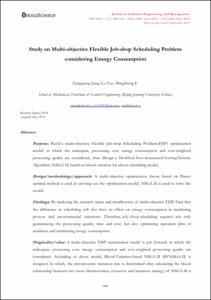Mostra el registre d'ítem simple
Study on multi-objective flexible job-shop scheduling problem considering energy consumption
| dc.contributor.author | Jiang, Zengqiang |
| dc.contributor.author | Zuo, Le |
| dc.contributor.author | Mingcheng, E. |
| dc.date.accessioned | 2014-07-30T08:32:26Z |
| dc.date.available | 2014-07-30T08:32:26Z |
| dc.date.issued | 2014-07 |
| dc.identifier.citation | Jiang, Zengqiang; Zuo, Le; Mingcheng, E. Study on multi-objective flexible job-shop scheduling problem considering energy consumption. "Journal of Industrial Engineering and Management", Juliol 2014, vol. 7, núm. 3, p. 589-604. |
| dc.identifier.issn | 2013-0953 |
| dc.identifier.uri | http://hdl.handle.net/2099/15005 |
| dc.description.abstract | Purpose: Build a multi-objective Flexible Job-shop Scheduling Problem(FJSP) optimization model, in which the makespan, processing cost, energy consumption and cost-weighted processing quality are considered, then Design a Modified Non-dominated Sorting Genetic Algorithm (NSGA-II) based on blood variation for above scheduling model. Design/methodology/approach: A multi-objective optimization theory based on Pareto optimal method is used in carrying out the optimization model. NSGA-II is used to solve the model. Findings: By analyzing the research status and insufficiency of multi-objective FJSP, Find that the difference in scheduling will also have an effect on energy consumption in machining process and environmental emissions. Therefore, job-shop scheduling requires not only guaranteeing the processing quality, time and cost, but also optimizing operation plan of machines and minimizing energy consumption. Originality/value: A multi-objective FJSP optimization model is put forward, in which the makespan, processing cost, energy consumption and cost-weighted processing quality are considered. According to above model, Blood-Variation-based NSGA-II (BVNSGA-II) is designed. In which, the chromosome mutation rate is determined after calculating the blood relationship between two cross chromosomes, crossover and mutation strategy of NSGA-II is optimized and the prematurity of population is overcome. Finally, the performance of the proposed model and algorithm is evaluated through a case study, and the results proved the efficiency and feasibility of the proposed model and algorithm. |
| dc.format.extent | 16 p. |
| dc.language.iso | eng |
| dc.publisher | OmniaScience |
| dc.rights | Attribution-NonCommercial 3.0 Spain |
| dc.rights.uri | http://creativecommons.org/licenses/by-nc/3.0/es/ |
| dc.subject | Àrees temàtiques de la UPC::Matemàtiques i estadística::Investigació operativa::Optimització |
| dc.subject.lcsh | Mathematical optimization |
| dc.subject.lcsh | Computer algorithms |
| dc.subject.other | Multi-objective scheduling |
| dc.subject.other | Flexible job-shop scheduling |
| dc.subject.other | NSGA-II |
| dc.subject.other | Energy consumption |
| dc.subject.other | Blood variation |
| dc.title | Study on multi-objective flexible job-shop scheduling problem considering energy consumption |
| dc.type | Article |
| dc.subject.lemac | Optimització matemàtica |
| dc.subject.lemac | Algorismes genètics |
| dc.identifier.dl | B-28744-2008 |
| dc.description.peerreviewed | Peer Reviewed |
| dc.rights.access | Open Access |
| local.citation.author | Jiang, Zengqiang; Zuo, Le; Mingcheng, E |
| local.citation.publicationName | Journal of Industrial Engineering and Management |
| local.citation.volume | 7 |
| local.citation.number | 3 |
| local.citation.startingPage | 589 |
| local.citation.endingPage | 604 |


